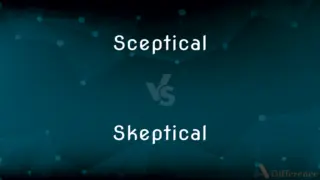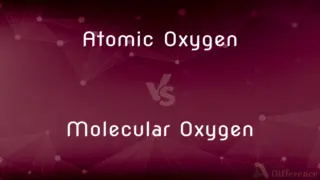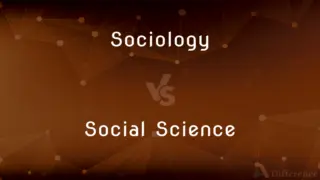Cardiomegaly vs. Cardiomyopathy — What's the Difference?
By Tayyaba Rehman & Urooj Arif — Updated on March 20, 2024
Cardiomegaly is an enlargement of the heart, often indicating an underlying condition, while cardiomyopathy refers to diseases of the heart muscle affecting its function.

Difference Between Cardiomegaly and Cardiomyopathy
Table of Contents
ADVERTISEMENT
Key Differences
Cardiomegaly primarily indicates an enlarged heart seen on imaging tests, suggesting the heart is working harder than normal. It can result from various conditions, including hypertension or valvular heart disease. On the other hand, cardiomyopathy encompasses a group of diseases directly affecting the heart muscle's structure and function, leading to weakened heart pumping ability and arrhythmias.
While cardiomegaly is a symptom or a physical state that can be observed through diagnostic imaging, reflecting changes in the heart's size, cardiomyopathy describes specific pathologies affecting the heart muscle fibers, making it a more specific diagnosis related to the heart's function.
Cardiomegaly can be a consequence of cardiomyopathy, as the heart muscle's weakening or structural changes often lead to heart enlargement. However, cardiomyopathy can exist without significant cardiomegaly, especially in its early stages or in forms where the heart muscle's thickening doesn't necessarily enlarge the heart.
Treatment approaches for cardiomegaly focus on managing the underlying cause, such as controlling high blood pressure or repairing heart valves, to reduce the heart's workload. In contrast, treatment for cardiomyopathy might involve medications to improve heart function, devices to support or correct heart rhythm, or in advanced cases, heart transplantation.
The prognosis for individuals with cardiomegaly depends greatly on the underlying cause and how well it can be managed. For those with cardiomyopathy, the outlook can vary widely based on the type of cardiomyopathy, its severity, and how well treatments can control the disease's progression.
ADVERTISEMENT
Comparison Chart
Definition
Enlargement of the heart.
Diseases affecting the heart muscle.
Causes
Hypertension, valve disorders, heart diseases.
Genetic, acquired conditions like infections or toxins.
Symptoms
Often asymptomatic, can include breathlessness, fatigue.
Shortness of breath, fatigue, arrhythmias.
Diagnostic Methods
Imaging tests (X-ray, echocardiogram).
Echocardiogram, MRI, genetic testing.
Treatment
Addressing underlying cause, medication, lifestyle changes.
Medications, lifestyle changes, devices, transplantation.
Compare with Definitions
Cardiomegaly
Enlargement of the heart, often due to hypertension.
Cardiomegaly on an X-ray suggests the patient's heart is larger than normal.
Cardiomyopathy
Diagnosed through echocardiograms and sometimes genetic testing.
An echocardiogram can help diagnose cardiomyopathy by showing changes in heart muscle.
Cardiomegaly
Detected through diagnostic imaging.
An echocardiogram showing cardiomegaly indicates an enlarged heart.
Cardiomyopathy
Symptoms include fatigue and arrhythmias.
People with cardiomyopathy often experience irregular heartbeats.
Cardiomegaly
Treatment focuses on the underlying condition.
Treating the cause of cardiomegaly can help reduce heart enlargement.
Cardiomyopathy
Can be inherited or acquired.
Genetic factors play a significant role in some types of cardiomyopathy.
Cardiomegaly
May result from heart valve issues.
Valve disorders can cause cardiomegaly by forcing the heart to pump harder.
Cardiomyopathy
Treatment may include medications or heart transplant.
Advanced cardiomyopathy might require a heart transplant to improve the patient's quality of life.
Cardiomegaly
Cardiomegaly (sometimes megacardia or megalocardia) is a medical condition in which the heart is enlarged. As such, it is more commonly referred to simply as "having an enlarged heart".
Cardiomyopathy
Cardiomyopathy is a group of diseases that affect the heart muscle. Early on there may be few or no symptoms.
Cardiomegaly
Enlargement of the heart. Also called megalocardia.
Cardiomyopathy
A disease or disorder of the heart muscle, especially of unknown or obscure cause.
Cardiomegaly
Megalocardia
Cardiomyopathy
(pathology) The deterioration of the myocardium.
Cardiomegaly
An abnormal enlargement of the heart;
Mild cardiomegaly is common in athletes
Cardiomyopathy
A disorder (usually of unknown origin) of the heart muscle (myocardium)
Common Curiosities
Can cardiomegaly be treated?
Treatment aims at the underlying cause, possibly including medication and lifestyle changes.
What is cardiomegaly?
Cardiomegaly is the enlargement of the heart, often discovered through imaging tests.
How is cardiomegaly diagnosed?
Through diagnostic imaging, such as X-rays or echocardiograms.
Can cardiomyopathy be cured?
There's no cure, but treatment can manage symptoms and prevent complications.
What are the types of cardiomyopathy?
They include dilated, hypertrophic, and restrictive cardiomyopathy, among others.
Is cardiomyopathy genetic?
Yes, some forms are inherited.
How does cardiomyopathy affect the heart?
It affects the heart's structure and impairs its function.
Is cardiomegaly the same as heart failure?
No, but it can be a sign of heart failure or other heart conditions.
Is cardiomyopathy a form of heart disease?
Yes, it's a type of heart disease that specifically affects the heart muscle.
What are the symptoms of cardiomyopathy?
Symptoms can include breathlessness, fatigue, and arrhythmias.
How is cardiomyopathy diagnosed?
Diagnosis may involve echocardiograms, MRI, or genetic testing.
What treatments are available for cardiomyopathy?
Treatments include medication, lifestyle adjustments, and in some cases, surgical options.
Can lifestyle changes improve cardiomyopathy?
Yes, lifestyle changes can help manage symptoms and improve quality of life.
Share Your Discovery

Previous Comparison
Larva vs. Lava
Next Comparison
Lithology vs. GeologyAuthor Spotlight
Written by
Tayyaba RehmanTayyaba Rehman is a distinguished writer, currently serving as a primary contributor to askdifference.com. As a researcher in semantics and etymology, Tayyaba's passion for the complexity of languages and their distinctions has found a perfect home on the platform. Tayyaba delves into the intricacies of language, distinguishing between commonly confused words and phrases, thereby providing clarity for readers worldwide.
Co-written by
Urooj ArifUrooj is a skilled content writer at Ask Difference, known for her exceptional ability to simplify complex topics into engaging and informative content. With a passion for research and a flair for clear, concise writing, she consistently delivers articles that resonate with our diverse audience.















































